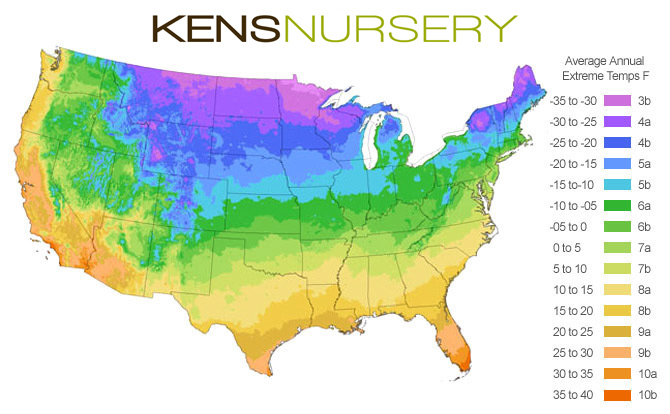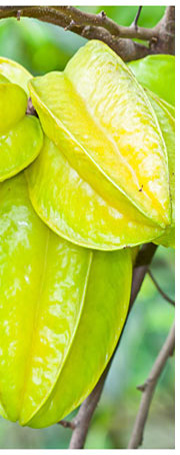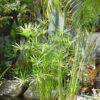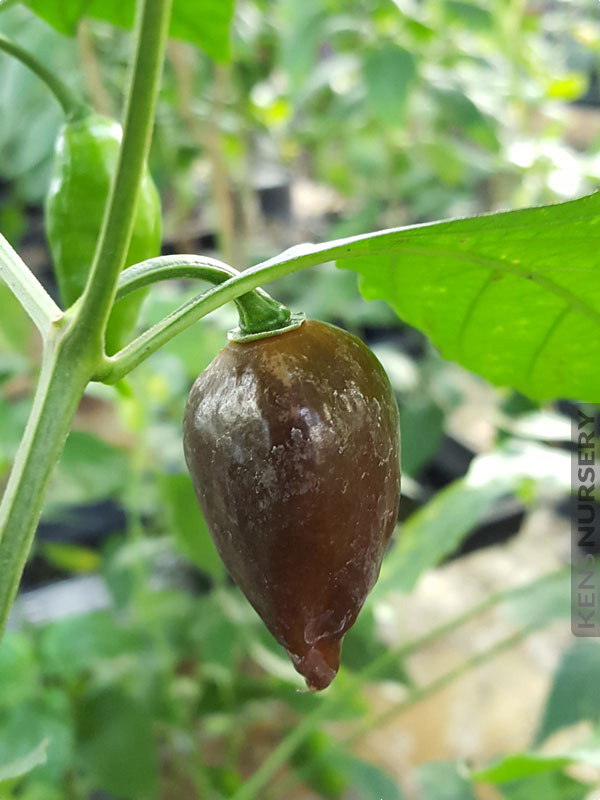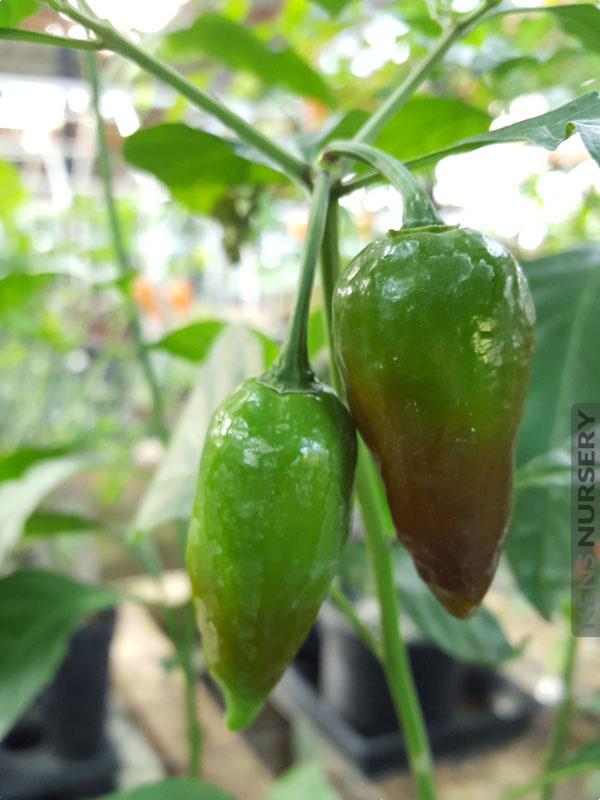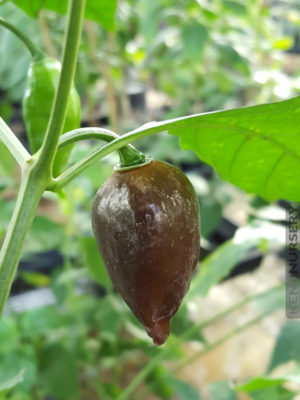| OUTDOOR |
PATIO |
| SOIL TYPE |
% SUN |
| POT SIZE |
INCLUDES |
ABOUT THIS PEPPER
Chocolate Bhut Jolokia Pepper, Damn that’s Hot!! These ugly beauties register 800,000 to 1,001,304 Scoville heat units. Also known as a Ghost Pepper, the fruit pods are unique among peppers, with their characteristic shape, and very thin skin. Ripe peppers can be 2 to 4 inches long and pack a 1, 2 punch when eaten, first with an intense chili flavor then followed in 30 – 45 seconds by the heat. Be prepared as the burning can last for 30 to 40 minutes. That’s hot sauce with a kick! These are very healthy plants with well established root systems.
The growth rate and fruit yield of Chocolate Bhut Jolokia will vary greatly depending on soil type, sunlight, temperature and other factors. Leaves are trimmed prior to shipping to reduce transpiration and travel stress.
PEPPER CARE
So you want to raise your own hot peppers?! It’s a rewarding experience to know that the sauce you just put on your eggs, chicken, salad, corn chips or fingers was grown and made by you. And just because we refer to these little bombs of flavor as sweat inducing, pungent, biting, heart melting, right hook wielding, odd, ugly, blistering and downright demons doesn’t mean they are hard to manage. We would just recommend some caution, after all most of them are capable of taking down a grown man in battle armor without a second glance. BOOM So here is the 411 on getting your own army of ass kickers up and growing. First and foremost do not plant outside until all danger of frost has passed. Frost is sure to kill your new little warriors. Keep your plant indoors unless you have a greenhouse, then by all means you can plant anytime. You lucky dog.
When you receive your new pepper plant, there is no need to worry about planting right away. Your new plant can be stored for a while by simply placing it in a bucket with about a half inch of water in the bottom and moving it to a shady location. You can then add some mulch to the bucket to keep your plant standing upright. The mulch will also supply nutrients while in storage. This will give you plenty of time to select the ideal location for your new Pepper plant.
CONTAINER SIZE
Most all of our peppers will thrive quite well in a pot, just be sure to allow room for root growth being sure to also take into consideration how tall your pepper plant may get. You certainly don’t want to come home to a toppled plant because the height was more than the base could handle. With the exception of the Mexican Pepper Trees which grow quite fast and quite large, be sure to start with a small container that will keep it balanced. Remember pepper plants for the most part will live for years, sometimes even decades so make sure to allow for adequate room for growth. They tend to be Annuals in temperate climates and Perennials in tropical and sub-tropical climates. This also goes for plants grown in containers and kept at constant temperatures by means of greenhouse or by bringing indoors during cooler months.
SOIL
Chocolate Bhut Jolokia Peppers enjoy well drained but moist, rich organic mix, ideally with a pH of 5 or 6. You can also use generic potting soil and cactus soil and mixing them 50/50 works well too. Water pepper plants when the top inch or two of soil is dry. Allow for good drainage so as not to rot the roots. They like to be moist not wet.
FERTILIZER
These plants are producing food you will be consuming, so make sure to use a high quality, balanced fertilizer (15-15-15) by a company that you trust. Note: The heavy salts in cheap fertilizers will damage the roots and possibly kill the pepper plant.
GROW ZONE & LIGHT
Best outdoors if grown in zone 7-9b, find your zone here. Keep your zone in mind when planting directly in ground. If your container growing, the zone is almost irrelevant because you can move the plant to protect it from any type of inclement weather. For in ground planting you’re going to want to keep your pepper plants in a sunny area where they will receive at least 10+ hours of dappled or full sunlight. The patio zone is 4a-9b which means the potted Pepper will flourish over the summer months in colder zones but must be brought inside before any sign of frost.
BEFORE YOU PLANT OUTDOORS
Here at Kens Nursery these Peppers are grown under 20-40% shade cloth. If you plant directly in full sun you may experience leaf burn. It is best to acclimate this Pepper to its environment by keeping it outside and slowly moving it into a sunny area over a week or two to avoid stress before planting.
WHAT IS THE SHIPPING SIZE
All Chocolate Bhut Jolokia Peppers for sale will vary in size. In the spring, Pepper plants are often smaller than plants shipped in the fall. Plants designated with a sku ending in -4, or -3 will arrive in a standard 4 inch or 2.75 inch growers pot respectively. Kens new, reusable, recyclable deep cells are 5 to 7 inches deep and 1 to 2.5 inches in diameter. Plants growing in these cells are easy to transplant and allow for deeper, faster growth and are designated with a -5, or -7. (Note: The item sku number can be found just below the buy button.) The color and style of these pots may vary. If we are out of a particular size item, we may ship a larger size at no additional charge. You can see the various pot sizes and actual plants ready to ship. (click-here)
Note: Before leaving, Chocolate Bhut Jolokia Peppers are inspected, watered, pruned and topped to 36″ if necessary, to facilitate shipping. Your new Peppers’ pot is then bagged to ensure that the soil stays in the pot and not loose in the box. Then your Pepper is tissue or kraft paper wrapped and secured in place with natural biodegradable peanuts. You will be pleased.
You may want to buy Chocolate Bhut Jolokia online now while they are in stock.
A FEW TIPS
When its time to harvest these bad boys. ALWAYS WEAR GLOVES made from either Nitril or Latex. Cloth gloves will absorb juice if you happen to crack open a pepper when picking and transfer it right to your skin, where you will at some point later rub your eyes or face and be in serious pain. Food grade plastic gloves are porous and you will suffer the same demise as cloth gloves. Have a small pair of snips or scissors handy, just for harvesting the hot peppers. Residual sap from the stems will linger on the blades. If you wash them thoroughly this sap may still transfer on to the next item you cut with them. Have a plastic bag at the ready for depositing the peppers into. We recommend separate bags for separate species so you don’t mix up the mild ones with the blistering ones. Plus the sap and juices from the stems and peppers can’t permeate a good plastic bag.

